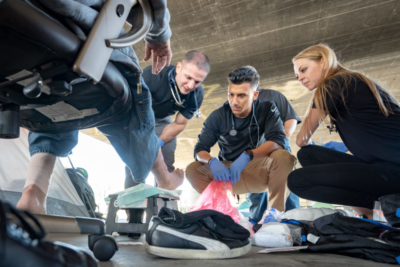The board has started implementing several community initiatives as part of an ongoing discussion on DPS’s role at the university.
(Originally posted at USC News)
By Grayson Schmidt
The USC Street Medicine program has launched a pilot project with the USC Department of Public Safety to be the “first responders” delivering care to the unhoused population around the University Park Campus.

Brett Feldman, Eddie Menacho and Gabrielle Johnson work as part of the Street Medicine team at USC, which provides medical care to people who are living on the streets. (Photo/Chris Shinn)
The partnership will be a template for future non-police responses for homelessness, mental health-related and community-based violence intervention support, and is one of the new programs underway as part of the university’s implementation of the DPS Community Advisory Board’s recommendations.
After the DPS Community Advisory Board published its report earlier this year, the university has started implementing several community initiatives as part of an ongoing discussion on DPS’s role at the university.
DPS Community Advisory Board: 10 months examining USC practices
During the 2020-2021 academic year, the 19-member advisory board spent 10 months examining USC’s public safety practices, including hiring, finances, accountability and bias training. This resulted in the creation of the ONE USC Safety Vision, which describes an “environment where everyone feels safe, respected, and protected from being a crime victim, and where the diverse experiences and needs of all USC students, faculty, staff and neighbors throughout USC’s spheres of influence are addressed.”
To achieve these goals, the advisory board presented 45 recommendations grouped into four pillars: accountability, alternatives to armed response, community care and transparency.
Following the July release of the ONE USC Safety Vision report, the university immediately formed the Community Advisory Board Implementation Team, to examine how to best implement the recommendations.
Recommendations of DPS Community Advisory Board being implemented
Some implementation efforts that are in the works:
∙ An official, public-facing ONE USC vision statement has been drafted and is being reviewed. The statement will guide the advisory board implementation team on designing the policies and programs for the other 44 recommendations.
∙ General guidelines, strategies and target timelines have been drafted for the formation and operation of a permanent Community Advisory Board. That board will serve as an ongoing oversight body for DPS, supporting accountability and community engagement. The goal is to launch the new board in the spring with representation that includes students, faculty, staff and members of the local communities.
∙ A public policy statement about the seriousness of racial profiling has been drafted by the Office of Diversity, Equity and Inclusion and is being reviewed.
∙ The Department of Psychiatry and the Behavioral Sciences at the Keck School of Medicine of USC and USC Student Health are working towards the launch of an important partnership with DPS to have mental health professionals take the lead on mental health welfare checks. The majority of this special team of professionals has been hired and is undergoing training with plans for a full launch of the program in fall 2023.
The first phases of expanding trauma-informed mental health resources have been implemented. This includes mental health staff having the ability to engage in 1½ hours of monthly trauma consultation and education trainings; students requesting care being screened for racial trauma; students having the ability to request a provider based on cultural identities who offer culturally informed care; and embedded clinicians in Student Equity and Inclusion Programs offices to offer tailored support to the cultural centers.
A comprehensive community update is expected in early 2022.